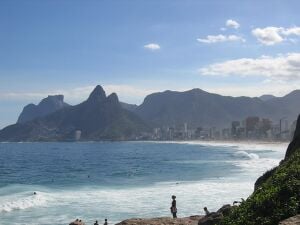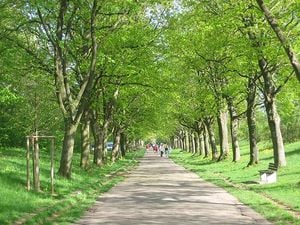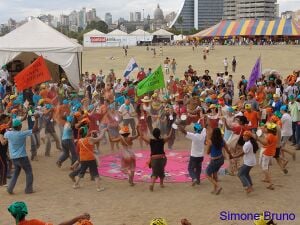The aim of this page is to recognise, celebrate and encourage the self-empowerment of community agency networks (CANs) and community groups across Rio de Janeiro.

 Sustaining birds, bees & communities, Rio’s grassroots agroforestry, news.mongabay.com (Aug 13, 2024)
Sustaining birds, bees & communities, Rio’s grassroots agroforestry, news.mongabay.com (Aug 13, 2024)  Rio de Janeiro bay reforestation shows mangroves’ power to mitigate climate disasters, apnews.com (May 24, 2024)
Rio de Janeiro bay reforestation shows mangroves’ power to mitigate climate disasters, apnews.com (May 24, 2024)  Rio’s dolphins back from the brink of extinction thanks to education and research, news.mongabay.com (Apr 30, 2024)
Rio’s dolphins back from the brink of extinction thanks to education and research, news.mongabay.com (Apr 30, 2024)  Record heat index of 62.3C scorches Brazil’s Rio de Janeiro, aljazeera.com/ (Mar 18, 2024)
Record heat index of 62.3C scorches Brazil’s Rio de Janeiro, aljazeera.com/ (Mar 18, 2024)
Networks and sustainability initiatives[edit | edit source]
- Neighbourhood initiatives across Rio de Janeiro
Communities online[edit | edit source]
RioOnWatch.org, English language mirror to Favela.Info, a collective blog about the changes and happenings in Rio de Janeiro in the lead up to the 2016 Olympic Games, to be held in the city.
Cycling activism[edit | edit source]
The city has 160 km (99 mi) of cycle paths that, wherever they exist, are very much preferable to riding in the city's traffic. Most paths run alongside beaches and extend intermittently from the Marina da Glória, Centro, through Flamengo, Copacabana and Ipanema, to Barra da Tijuca and Recreio dos Bandeirantes. six km (3.7 mi) of cycle paths traverse the Tijuca National Park.
Bike Itaú is a public bicycle sharing system in the city of Rio de Janeiro, Brazil. It is run by PBSC Urban Solutions and started on 20 February 2018, and is sponsored by the municipal government of Rio de Janeiro in partnership with Banco Itaú. The system replaced the old one, operated by Serttel a private concessionaire, that began operations in October 2011. The old bike sharing system had 4000 bicycles available at 400 rental stations located throughout several neighborhoods in the city. The rental stations are powered by solar panels.
Food activism[edit | edit source]

Imagine that a friend tells you there's a fancy new restaurant in town. At first, you might not care, since there's a pretty slim chance of you eating out at any kind of restaurant. Now imagine your friend telling you that at this gourmet dining hall, with high-end lighting design, furniture, and art installations, homeless patrons are not just welcomed, but fed for free.
Sharing[edit | edit source]

Rio de Janeiro is a city of extremes. Inequality is rampant, and while a small elite enjoy the "luxury" of housing, high quality education, and concentrated public funding, the majority of its citizens share the rest. The best examples of sharing are born not out of excess but from scarcity and collective problem solving. How do you build a house without money? How can you study if you can't afford to pay for a bus to class? How can a farmer survive with no land? How can people without access to resources reasonably start up a working business? And of course – how can people help each other stay safe?[1]
These community groups are transforming Rio de Janeiro into a Sharing City:
Biodiversity[edit | edit source]
Social inclusion[edit | edit source]

- Catalytic Communities (CatComm/ComCat)[2] or CatComm - uses technology to link grassroots community groups so they can learn from each other's successes, and support one another's work. When community organizations tackle local problems, their work would be easier if they knew about successful programs in similar neighborhoods around the world.
CatComm realizes people solve crises in their communities every day, and the Internet is the perfect tool to replicate these successes.They collect and posts how-to examples in our Community Solutions Database. These real-life stories address a wide range of issues, from HIV prevention to spurring economic growth, providing effective care for children and the elderly, and much more. The database of over 130 projects inspires people to make a difference around the world.
- Catalytic Communities (CatComm/ComCat) (a.k.a.: Comunidades Catalisadoras (ComCat)), link checked 18:05, 30 November 2021 (UTC)
Sustainable transport activism[edit | edit source]
Walkable city streets are commonly closed on Sunday in major cities (of Brazil), one notable example being Avenida Atlântica in Copacabana, Rio De Janeiro.[3]
Towards sustainable economies[edit | edit source]
Circuito Rio Ecosol - SEDES on facebook, Rio's solidarity economy circuit
News and comment[edit | edit source]
2022
 Rio's residents garden their way out of hunger, BBC News (Jul 02, 2022)
Rio's residents garden their way out of hunger, BBC News (Jul 02, 2022)
2017
The three-degree world: cities that will be drowned by global warming, Nov 3[4]
2016
The Favela as a Community Land Trust: A Solution to Eviction and Gentrification? Nov 15[5]
Solidarity Economy Part I: Cooperative Development in Rio and Beyond, Sep 29[6]
2015
Rio de Janeiro named as first 'fully committed city' in fight against climate change, August 31[7]
2014
The Cost of Living in Rio de Janeiro Is Too Damn High, time for the Surreal? January 30[8]
About Rio de Janeiro[edit | edit source]
Rio de Janeiro (Portuguese: [ˈʁi.u d(ʒi) ʒɐˈne(j)ɾu] ), or simply Rio, is the capital of the state of Rio de Janeiro. It is the second-most-populous city in Brazil (after São Paulo) and the sixth-most-populous city in the Americas.
External links
- Public transport in Rio de Janeiro, Social issues in Rio de Janeiro, Sustainability in Rio de Janeiro
References
- ↑ By Shanna Hanbury, May 17, 2018 Shareable
- ↑ (a.k.a.: Comunidades Catalisadoras (ComCat)), link checked 18:05, 30 November 2021 (UTC)
- ↑ wikipedia:Ciclovía#Brazil
- ↑ The Guardian
- ↑ rioonwatch.org
- ↑ rioonwatch.org
- ↑ edie.net
- ↑ globalvoicesonline.org
